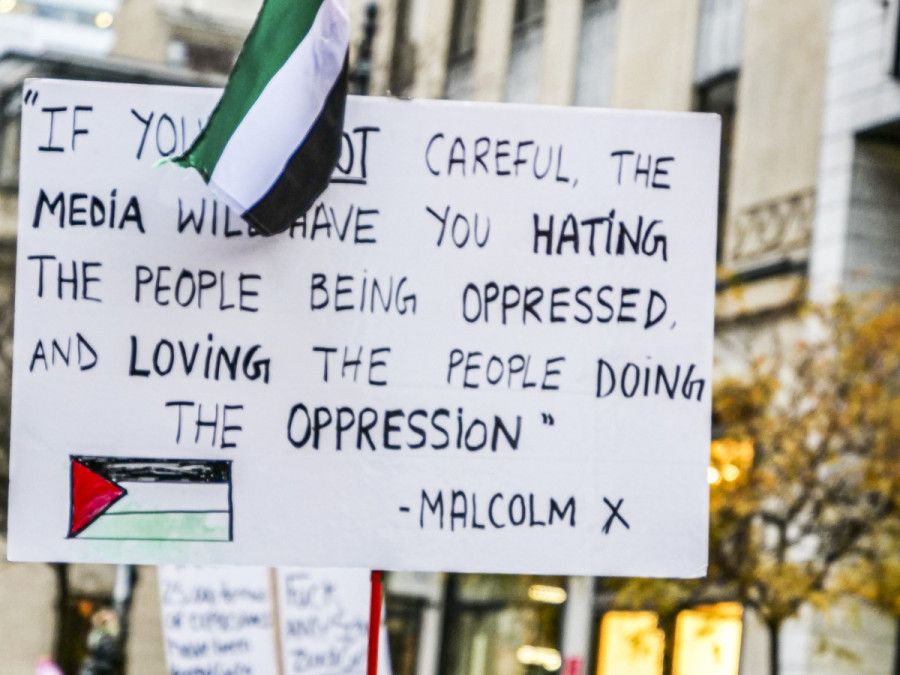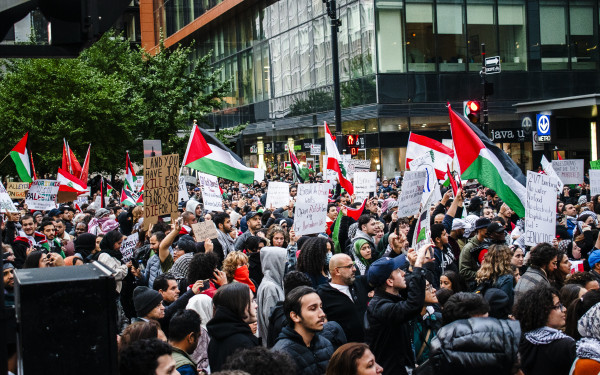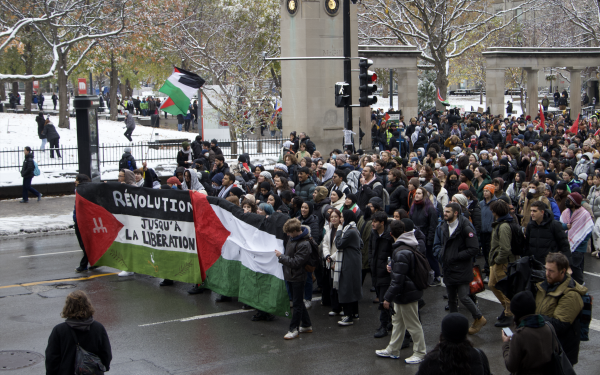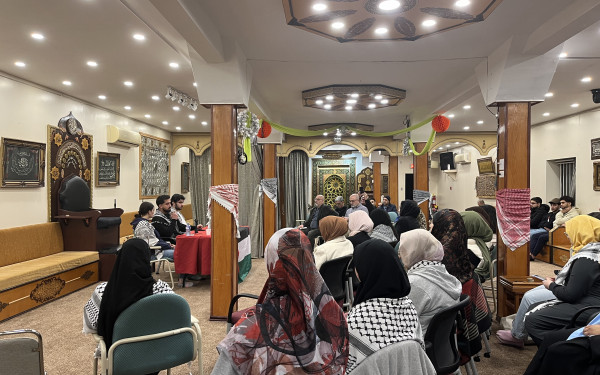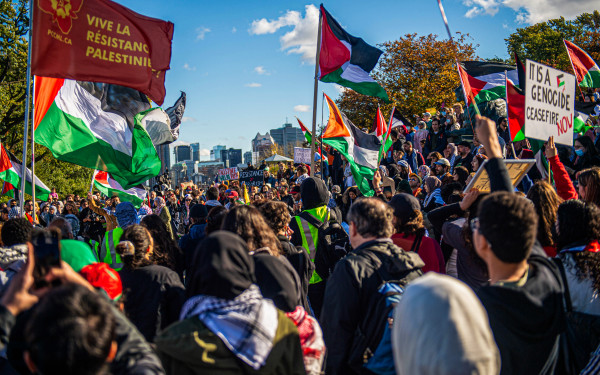Hall building altercation: Students share their perspectives
Concerns increase over student safety and rise of antisemitism and Islamophobia
Content warning: this article mentions rape, homophobia and violence.
On Nov. 9, The Link published an article on the escalation between two student groups in the Hall building. The Link has talked to several sources since then and is expanding on the events in this piece.
On Nov. 8, two student groups, Concordia’s Solidarity for Palestinian Human Rights (SPHR) and Israeli student club StartUp Nation, set up individual tabling events at the same time.
Tensions began to rise around 11 a.m. at the mezzanine of the Hall building where both student groups had reserved a table with the Concordia Student Union (CSU) for the same day. Neither group was aware of the other’s booking.
SPHR had set up a keffiyeh sale to fundraise for humanitarian relief to Gaza, which was announced on their Instagram on Nov. 6.
StartUp Nation had booked the table for 12 p.m., but set up early by taping up posters of the 240 hostages taken by Hamas on Oct. 7 in Israel. The posters were taped on a wall in front of SPHR’s table.
Pro-Palestine supporters started removing posters of the hostages. An organizer with SPHR insisted that they were not from their organization and denounced the act.
Concordia campus safety and prevention services as well as Dean of Students Andrew Woodall arrived soon after a few people removed the posters of the kidnapped. StartUp Nation students were then told that the posters had to be removed because they did not follow Concordia’s postering and flyer guidelines.
“Honestly, they’re a club and we’re a club too. So I don’t condone removing anything,” said the SPHR organizer, who wished to remain anonymous for safety reasons. “There was a student who got provoked (by the sight of the posters) but we instantly stopped him. I was literally right in front [of the students from StartUp Nation] when I told him to stop,” they added, according to a Link reporter in a previous article published on Nov. 9.
According to The Link reporters on site, an organizer with StartUp Nation said they had no intention of causing turmoil with anyone involved.
“We put up our posters before [SPHR] set up their table. We didn’t know that they would be here,” said the president of StartUp Nation. “There was one student wearing a keffiyeh sitting here, but she did not say anything. I cannot read minds.” The Link has kept them anonymous for their safety.
By noon, StartUp Nation had set up two tables away from SPHR’s fundraiser. Organizers explained that it was an “artistic representation” of a Sabbath dinner with chairs, plates, and cups purposely left empty to “represent what a family would look like, but no one is here,” according to a StartUp Nation organizer.
“We have full families taken as hostages, who we don’t know if they’re alive,” they added.
At the same time, a line of at least 100 students wrapped around the mezzanine for the keffiyeh fundraiser.
Escalation
Shortly after noon on Nov. 8, an unaffiliated Palestinian Concordia student accused StartUp Nation’s event of insensitivity and provocation. The student’s name is kept anonymous for their safety.
Both the student and the vice president external of StartUp Nation began arguing loudly. Campus safety staff and students from both clubs repeatedly attempted to de-escalate the situation. A separate student bystander then started chanting, “Free, free, Palestine.” The crowd in the mezzanine echoed the chant in a resounding manner.
Chants continued, and more heated shouting was exchanged between students from both sides.
When chanting began, pro-Israel students had pre-made signs reading “false claims of genocide are hate crimes,” “Israel is my only home,” “bring them home” and “peace and prosperity for all.”
Kaia, a first-year Concordia student, who wished to remain anonymous for safety reasons, planned to attend the keffiyeh sale to show her solidarity with Palestine. However, once she reached the Hall building, she felt the tension in the air. “The first thing I saw were so many posters [...] of horrible statements like ‘calling it a genocide is a hate crime,’” she said. “ To see all those [signs] as someone who is hurt by what's happening to the Palestinians was just like a slap to the face,” she added.
Aypa, a non-Concordia student kept anonymous for her safety who had gone to the fundraiser to buy herself a keffiyeh had heard some people on the pro-Israel side call the pro-Palestine students “terrorists and Hamas sympathizers.”
Around 12:30 p.m., students from both communities began encouraging each other to call non-students to come onto campus.
At the same time, seven of The Link’s student reporters who were on the scene witnessed and captured videos of dozens of students and non-students taunting, threatening, invasively filming, as well as verbally and physically assaulting each other.
As tensions escalated, Layal, a Concordia student present on-site, was hit by a poster from someone on the pro-Israel side. They have been kept anonymous for their safety.
“Security came in, but barely did anything,” said Layal. “I was a little disappointed. You could tell from his (the assailant) body language that he was getting very angry and aggressive, but he wasn’t asked to leave once.”
Kaia also shared similar concerns over Concordia’s campus safety and prevention services. “The security guards were only looking at us. As if the pro-Israel students are the only ones that need protection. As if pro-Palestinians are [...] crazy,” she said.
Michael Eshayek, the Vice President of External of StartUp Nation disagreed with that portrayal. “In the beginning, [security] created a line, separated between the pro-Palestinians and the pro-Israelis. After 30 [or] 40 minutes, it wasn't a line anymore, the Palestinians surrounded us,” he said.
Aziz, a student present during the altercations, who wished to remain anonymous for safety reasons, affirmed that the presence of non-students on campus only escalated the tension between the two groups.
While standing on the pro-Palestine side, a middle-aged non-student on the pro-Israel side was “taunting and jeering” at Aziz and his friends, trying to provoke them. The woman proceeded to ask Aziz if he was Canadian several times and that “They (the Arabs) would kill you in the Middle East,” as he identifies as a part of the LGBTQIA2S+ community.
The same woman was caught on video verbally assaulting another student with homophobic statements in an attempt to provoke them.
The video shows the non-student asking the student, “Are you gay?” to which the student—who is a member of the LGBTQIA2S+ community—replies, “What does that matter?”
The student told The Link that the non-student then said, “You know, they’d fucking rape you up the ass.” The student said they responded by saying, “You know what, that’s pinkwashing, and you’re a fucking cunt,” according to a Link reporter in an article published on Nov. 9.
A video of the interaction became viral on X, formerly known as Twitter, after it was uploaded by the Centre for Israel and Jewish Affairs (CIJA). On the same day, a right-wing commentator accused the student of using an antisemitic k-slur, instead of the word “cunt,” which the student alleges they used in defence. In an interview with The Link, the student denied using any antisemitic slur during the altercations. The student said it was the first time they had ever heard of this antisemitic k-slur.
CIJA called out the student for “verbally assaulting, shoving and harassing Jewish people.”
The Link reporters witnessed pro-Palestine protesters attempting to alert campus safety that members of StartUp Nation were “trying to instigate.” An altercation then took place between a pro-Palestine student who had entered the pro-Israel crowd. She was pulled out of the crowd by campus safety and members of SPHR attempted to de-escalate.
The Link witnessed a second physical altercation occur when one pro-Palestine individual reached across the security line to grab an Israeli flag, spurring a physical altercation between both sides and security to retrieve the flag. A pro-Israel individual attempted to kick pro-Palestine demonstraters in the face. The security team pulled him back and no arrests were made to the assailant.
Police presence
Police were called at around 1:30 p.m. and upon arrival, demanded that the crowd leave the mezzanine. Pro-Palestinian chants continued outside the Hall building and a dozen police officers blocked the main entrance. One pro-Palestine student was arrested. They have since been released and are expected to appear in court for a hearing.
Upon their arrival on campus, police officers were filmed by The Link reporters in their interactions with pro-Palestine students. One officer grabbed a student by the throat and shoved them to the side while saying “I am going to push you if I want.” While entering the Hall building, police officers forcefully pushed pro-Palestine demonstrator out of the entrance and one officer was seen brandishing his baton.
According to an SPVM spokesperson, “Officers were trying to separate some people that were maybe more aggressive than others to try to calm down the situation.”
The SPVM spokesperson added that police officers were there to try to calm down every person that was involved and to try to get control of the situation and prevent any further injuries.
Concordia's downtown campus has seen other instances of violent police altercations in its history. During the 1969 Sir George Williams affair, protesters were beaten with clubs and forced down on broken glass. Eighteen-year-old demonstrator Coralee Hutchinson was struck on the head. She suffered a brain aneurysm shortly after, and her parents believe it was due to the trauma she’d received. In September 2002, pro-Palestinian demonstrators protested Israeli Prime Minister Benjamin Netanyahu’s speech that was meant to take place. Riot police were deployed in response. The protesters were pepper-sprayed and the building was tear-gassed.
Aftermath
According to Kaia, Concordia should have done more to prevent non-students from harassing students on campus.
“Why did [Concordia] allow [non-students] to talk to these Concordia students? Why did they allow them to rile these Concordia students up? Why weren't they escorted out of this building the second the uprising started?” she said.
When The Link asked Concordia to comment on the university’s responsibility to keep students safe from non-students on campus, Concordia’s spokesperson didn’t answer the question.
Just before midnight on Nov. 8, Concordia President Graham Carr sent out a mass email with a statement on the day’s events as well as a mention of other instances of “violence or incitement.” The correspondence also detailed the discovery of swastikas in one of the university’s buildings. The Link inquired about the location of the swastikas. Concordia’s spokesperson did not reveal that information. The Link is continuing to investigate the matter.
In an interview with The Link, Eshayek said the CSU could have done a better job at ensuring students felt safe and that the two tables weren’t booked on the same day.
According to Harley Martin, the general coordinator of the CSU, “Given the unacceptable way in which events ended on Nov. 8, the CSU regrets not taking more preventative measures.”
Martin also detailed how table booking works at the CSU: “The CSU reception team, which consists of five people at SGW, receives booking requests for the tables on the CSU mezzanine and either approves or denies them. There is no one person who receives requests and these separate bookings were approved by different receptionists carrying out their administrative duties as per their job descriptions and training with no input from the executive team,” Martin said.
Due to the events in the Hall building, the CSU is in the process of updating their table booking policy for the CSU Clubs in question.
Since Nov. 8, the CSU has also been in the process of scheduling meetings with Hillel Concordia, StartUp Nation, Chabad Concordia and SPHR on “what the CSU is doing, and will do, to prevent any such incident from occurring again, and to gather input simultaneously,” and has been in contact with Campus Safety and Prevention, the Dean of Students Office and other university departments “to ensure students can express themselves without compromising the safety of other students.”
Safety on and off campus
Both pro-Israel and pro-Palestine students have expressed that they do not feel safe on campus.
Eshayek said that he cannot comprehend going back to his classes after the altercation in the Hall building. “We cannot go back to classes and learn about math or learn about history [...] when we can't even respect each other and we can't even table in a civilized way,” he said. “I think the administration should wake up and should do something about the rise of antisemitism on campus.”
For Layal, the concerns over safety on campus are valid, but more nuanced than they seem. “I find it frustrating since I know some Jewish students are too scared to go to school. I get it, but at the same time it plays into the whole factor that we’re scary people to be around.”
Layal also believes that the university’s neutrality on the situation in Gaza is feeding into the tension on campus. “If only we had an outlet where we could discuss it properly. This is what the university is for. We’re supposed to be able to talk about hard topics.”
“We like to talk about human rights in classes and pretend like it matters,” they added, “but when human rights are violated in actuality, suddenly it’s not as clear.”
Aziz said that since Nov. 8, the university has not felt the same. “I have tried, for the past few days, to distance myself from the university because I definitely do not feel safe anymore,” he said.
Antisemitism has been on the rise since Oct. 7 in Montreal. A total of 38 hate crimes against the Jewish community were reported in the Oct. 7-25 time period, compared to the 50 hate crimes related to religion that were reported in 2022 as a whole. On Nov. 9 and 12, a total of three Montreal Jewish schools had shots fired at them. A synagogue was also hit by a Molotov cocktail in Dollard-des-Ormeaux on Nov. 6.
Islamophobia has seen a sharp rise since Oct. 7 in Canada, but has been an especially challenging systemic issue since Quebec’s introduction of Bill 21 four years ago. The SPVM reported a total of 14 hate crimes targeting the Arab-Muslim community in the Oct. 7-25 time period.
Following the events, SPHR and StartUp Nation both released official statements on their respective Instagram accounts. StartUp Nation “urges Concordia to take a clear stance against the heinous antisemitism infesting the university.” SPHR reminded everyone that the event will not deter them from “their continued advocacy for the freedom of the Palestinian people.”
According to a spokesperson for Concordia, “Our priority is the safety of our community and campus.”
With files from Diane Yeung and Julia Israel.
Aypa requested anonymity following the publication of this piece. The Link has granted her request and the article has been edited to reflect that.
This article originally appeared in Volume 44, Issue 6, published November 14, 2023.

